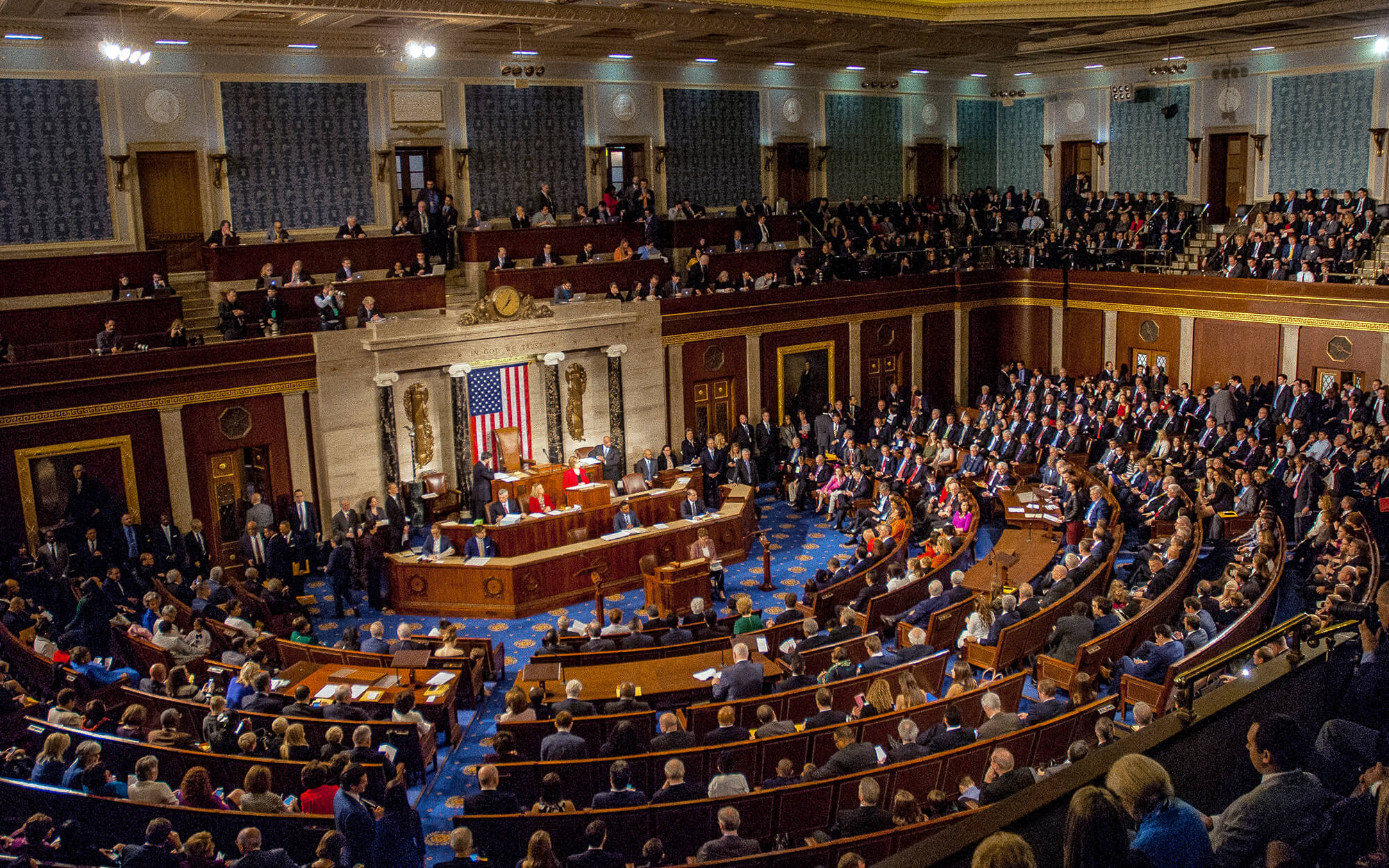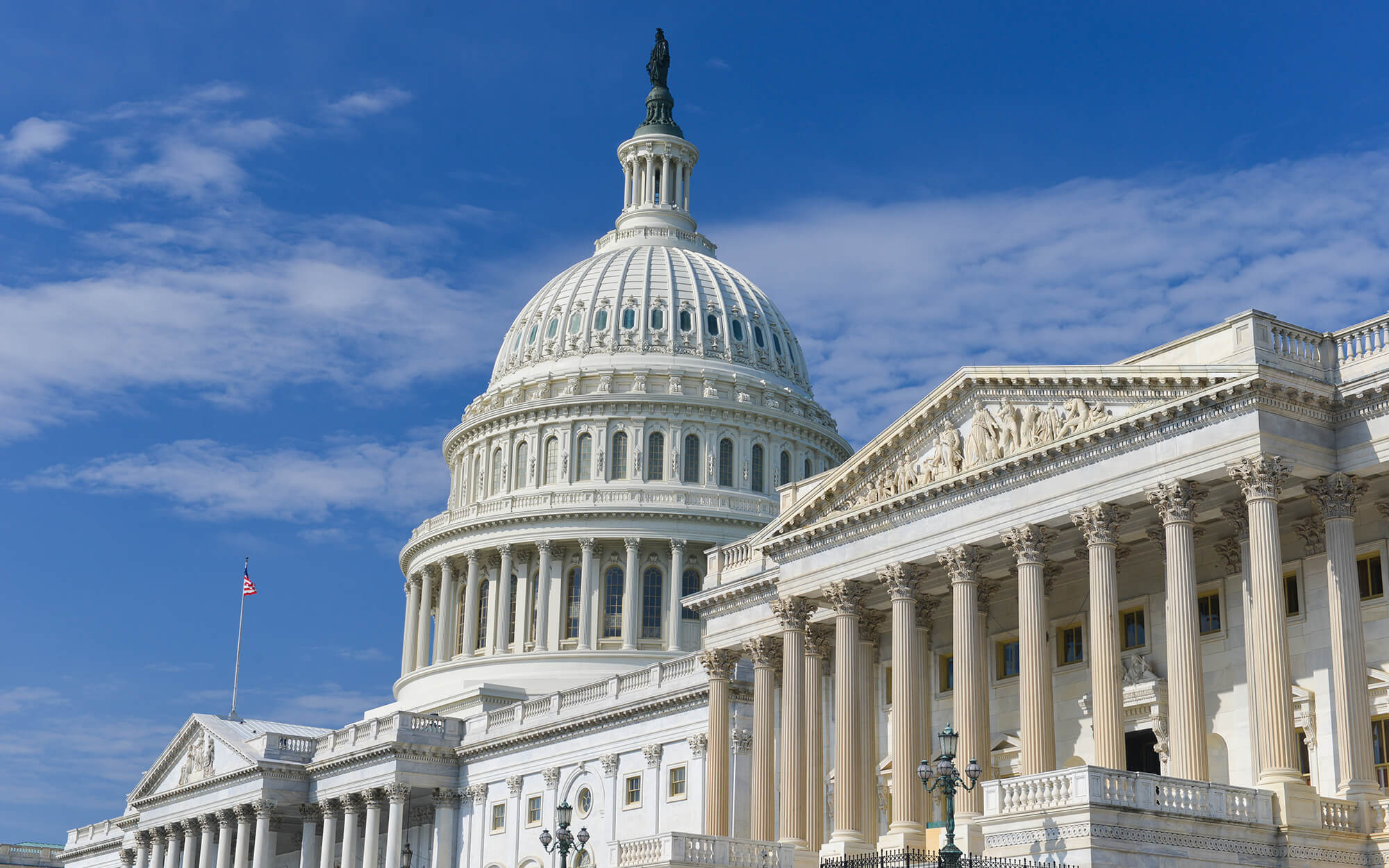When autocomplete results are available use up and down arrows to review and enter to select.

As votes continue to be counted in battleground states, the electoral picture is beginning to come into focus. Major networks have now called enough states to give former Vice President Joe Biden more than the winning threshold of 270 electoral votes in his bid for the White House. Importantly, President Trump has not conceded these states, and has called for recounts and mounted legal challenges.
Control of the Senate may be determined by a pair of run-off races in Georgia. Because no candidate in either November 3 race received more than 50 percent of the votes, Georgia election law requires the top two vote recipients in each race to face off in a run-off election to be held January 5th. Incumbent Senator David Perdue (R) will face challenger Jon Ossoff (D), and incumbent Senator Kelly Loeffler (R) will face Raphael Warnock (D).
Republicans are likely to secure 50 Senate seats, though vote counts continue in several races. A win in just one of the two Georgia races would secure Republican majority control of the Senate in the 117th Congress. Democrats’ hopes for winning a Senate majority hinge on victories in both of these races and an ultimate victory for Joe Biden in his White House bid. (The party that holds the White House holds a tie-breaking vote in the Senate.) If President Trump is reelected, it would be impossible for Democrats to capture the Senate.
While many House races have yet to be called, it is already clear the Republicans have added seats and retain a narrow possibility of ultimately winning a majority. Whatever the ultimate outcome, the House will be very narrowly divided, with the majority possibly holding a margin of just five or fewer members.
If Democrats do retain the majority, they will be at risk of losing it in the 2022 midterm elections, and moderate members from swing districts will be the most vulnerable. These factors would empower a bloc of moderate Democrats, whose political fortunes the Speaker must protect and whose votes would be needed to pass any legislation. This would shape legislative outcomes, potentially to the benefit of community banks. This moderate bloc will be a focus of ICBA’s advocacy.
We also highlight the impact of White House control in the leadership of cabinet agencies as well as the CFPB, OCC, and other independent agencies (see addendum to this memorandum).
The cyclical nature of party control makes it important to build strong relationships with elected officials and candidates from both sides of the aisle. ICBA is bipartisan, and we have spent considerable time and resources developing positive working relationships with members of Congress from both parties. ICBPAC contributions have always reflected this practice.
As we do at the beginning of every new Congress, ICBA will meet with every new member of the 117th Congress to discuss community bank policy priorities.

The newly elected, 117th Congress will be sworn in on January 5, 2021. The current Congress will return to Washington in the coming weeks to take up unfinished, year-end business, including the extension of government funding, which expires on December 11, and the National Defense Authorization Act for FY2021.
ICBA will continue to press for priority policy changes in the remaining days of the 116th Congress. ICBA will advocate for a COVID relief bill during the lame duck session addressing community bank priorities, which include automatic forgiveness for smaller Paycheck Protection Program (PPP) loans, forgiveness of EIDL Advances for PPP borrowers, a permanent 8 percent community bank leverage ratio, extension of troubled debt restructuring provisions of the CARES Act through 2021, suspension of CECL implementation till 2025 and a liability safe harbor for businesses from COVID-related lawsuits.

The possible election of Joe Biden would create a new environment that would carry both risks and opportunities for community banks.
If Republicans ultimately retain control of the Senate, the legislative environment will be constrained by the need for consensus, but regulatory risk will still come from the executive branch. Recent Presidents have made liberal use of executive orders to make policy traditionally within the purview of Congress, and a President Biden, should he ultimately prevail, would face strong pressure to do so as well.
ICBA will frequently have to play defense: stopping or improving adverse initiatives whether originating in the Senate, the House or the Administration and the agencies. At the same time, we can expect a more critical environment for large businesses including large banks. More specific policy opportunities for community banks are specified below.
Joe Biden campaigned on a promise to work across the aisle. Should he ultimately be elected we believe there would be opportunities for bipartisan initiatives. One clear message of the election results is the Democrats cannot neglect the center if they hope to remain competitive. Senator Mitch McConnell (R-KY), should he continue as Majority Leader, may also have compelling incentives to work with a Biden Administration. In the 2022 midterms, Senate Republicans will have to defend a number of seats in swing states, and it may serve their interests to tack toward the center. At the same time, today’s hyper-partisan atmosphere long predates the current or previous Administrations and will not evaporate overnight.
What’s at stake in control of the Senate. The majority party in the Senate controls the chairs, hearings and legislative agenda of each committee, as well as the Senate floor agenda. The majority leader is effectively a gatekeeper for all legislation. The majority leader does not control the votes of his party and may not hold his caucus together, but he does control what bills they vote on.
Congressional leadership. We believe that the two Senate caucuses will be led by Mitch McConnell and Chuck Schumer (D-NY), though it remains to be seen who the Majority Leader will be and who the Minority Leader will be.
In the House, Nancy Pelosi (D-CA) is expected to continue as Speaker and Kevin McCarthy (R-CA) as Minority Leader.

The near-term agenda: COVID relief. Regardless of which party controls the Senate, the first order of business will almost certainly be an ambitious COVID relief package. The passage of the election should facilitate deal making.
The contents of the package will be strongly influenced by the control of the Senate. This package could include a new small business lending program. Republican control of the Senate would result in a more narrowly crafted package.

Senate. The Senate Banking Committee is expected to be led by Pat Toomey (R-PA) and Sherrod Brown (D-OH). Party control of the Senate will determine which of them is Chairman and which is Ranking Member. Of note, Senator Toomey has indicated that he will not seek reelection in 2022. There could be a number of open slots on the Banking Committee, and ICBA will encourage Senators who support community banking to join. Banking Committee members Martha McSally (R-AZ) and Doug Jones (D-AL) have lost reelection. Thom Tillis (R-NC) is likely to retain his seat, though not all votes have been counted. As noted above, David Perdue (R) is in a run-off election against Jon Ossoff (D) in Georgia on January 5th.
House. Maxine Waters (D-CA) and Patrick McHenry (R-NC) are expected to continue as Chairwoman and Ranking Member of the Financial Services Committee, though some of the more important Subcommittee chair positions will become available. Greg Meeks (D-NY), Chair of the Consumer Protection and Financial Institutions Subcommittee, and Brad Sherman (D-CA), Chair of the Investor Protection, Entrepreneurship, Capital Markets Subcommittee are both vying in a three-way race for the chairmanship of the Foreign Relations Committee. If one of them wins, his subcommittee chairmanship on Financial Services will need to be filled. That race will be decided the week of November 30.
Policy risk. While the credit union industry will undoubtedly push for powers expansion in the new Congress, we do not anticipate a marked shift in credit union policy. ICBA will continue the Wake-Up Campaign to raise awareness of credit union abuses and oppose any effort by the industry to take advantage of the shift in power.
Should Pat Toomey become Senate Banking Committee chairman, he has stated that he will focus on reform of the housing GSEs—Fannie Mae and Freddie Mac. His vision for reform has not been favorable to community banks and risks ceding too much control of the GSEs to Wall Street. Because he is not seeking reelection, we expect that he would be less constrained by political risk.
Should Democrats capture the Senate, their predisposition toward more prescriptive regulation may lead to consideration of national interest rate caps, limits on overdraft fees and interchange fees as well as significant changes to the credit reporting system, including potentially a government-run credit bureau. Beyond the jurisdiction of the banking committees, risks to community banking include bankruptcy cramdown and postal banking. ICBA will strongly oppose all such efforts.
Policy opportunities. We can expect robust oversight and scrutiny of large banks and Wall Street institutions as well as non-bank competitors. The new Congress, regardless of party control, should be favorable to a legal safe harbor for cannabis banking; Bank Secrecy Act reform including a more favorable beneficial ownership rule; closure of the industrial loan company (ILC) loophole; legislation to support minority depository institutions (MDIs) and more favorable government sponsored enterprise (GSE) reform legislation that could restructure the GSEs as quasi-utilities.

Senate. The Senate Finance Committee will be led by Mike Crapo (R-ID), the current Banking Committee Chairman, or Ron Wyden (D-OR), the current Ranking Member. Again, control of the Senate will determine which of them is Chairman.
House. Richard Neal (D-MA) is expected to continue as Chairman of Ways and Means, and Kevin Brady (R-TX) is expected to continue as Ranking Member.
Policy risk. We do not believe that a Republican Senate would pursue significant changes to tax policy. We believe that they would be focused on protecting the 2017 Tax Cuts and Jobs Act. Should Democrats control the Senate, the risks include proposals put forward by a President Biden as well as incoming Chairman Wyden: a corporate tax rate as high as 28 percent; higher marginal rates for higher income individuals; full or partial rollback of passthrough deduction; higher capital gains rates; loss of step up in stock basis at death and a financial transactions tax.
Policy opportunities. Restoration of the state and local tax (SALT) deduction is a Democratic priority.

Senate. The current Chairman of the Small Business Committee, Marco Rubio (R-FL), will likely become Chairman of the Senate Intelligence Committee, if Republicans control the Senate. This would create an opening for Chairman, which will most likely be filled by either Rand Paul (R-KY), or if he chooses another committee, Tim Scott (R-SC).If Democrats control the Senate,Ben Cardin (D-MD), the current Ranking Member, is expected to become Chairman.
House. Nydia Velazquez (D-NY) is expected to continue as Chairwoman of the House Small Business Committee. On the Republican side, Steve Chabot (R-OH) is term limited as Ranking Member. The next most senior Republican is Delegate Amata Radewagen (R-AS). Troy Balderson (R-OH) or Kevin Hern (R-OK) may also seek the position.
Policy risk. Expect increased oversight of PPP loans, especially larger loans. With reports of fraud in the program mounting, and new leadership at SBA in a Democratic administration, Democrats will likely seek to enact vigorous oversight of a program often associated with the Trump Administration.
Policy opportunities. If Congress is indeed split between a Democrat-led House and a Republican-led Senate, expect a negotiation between Senator Rubio’s Continuing Small Business Recovery and Paycheck Protection Program Act (S. 4321) and Senator Cardin’s HEROES Small Business Lifeline Act (S. 4818).
Both bills contain a simplified forgiveness process for small PPP loans, allow for additional uses for PPP loans and provide PPP borrowers more flexibility in selecting their covered period for forgiveness. Additionally, Senator Cardin’s bill includes a repeal of the EIDL Advance deduction for PPP borrowers—a provision that Senator Rubio is not expected to oppose.

Senate. John Boozman (R-AR) is likely to become Chairman of the Agricultural Committee, should Republicans control the Senate, following the retirement of current Chairman Pat Roberts (R-KS). Should Democrats control the Senate,Debbie Stabenow (D-MI) is expected to become Chairwoman.
House. Chairman Collin Peterson (D-MN) lost his reelection bid. The next most senior Democratic member is David Scott (D-GA), who has announced his interest in the chairmanship. Other senior Democratic members are Jim Costa (D-CA) and Marcia Fudge (D-OH). Top contenders for the Ranking Member slot are Glen Thompson (R-PA), Rick Crawford (R-AR), and Austin Scott (R-GA). These members are well acquainted with community bank perspectives.
Policy agenda. The current farm bill will expire in 2023. Deliberations on a new farm bill will begin next year. ICBA will advocate for a farm bill with a strong safety net, continuation of a robust crop insurance program, enhanced guaranteed farm loan programs, and adequate funding to keep famers afloat.
Community banks will oppose any proposals by the Farm Credit System to expand their lending powers and efforts to add more social monitoring to guaranteed lending programs.
Climate change proposals for agriculture, including conservation practices, will likely receive greater attention. Farm income projections will also be a concern, and Congress will debate the extension of government payments that boosted farm income in 2020.

Women Candidates Make Strong Showing
We reported Wednesday on the success of ICBPAC-backed candidates. As of today, the ICBPAC-supported candidate success ratio has increased to 92 percent.
Women from both parties broke barriers on election night, with at least 131 women headed or returning to Washington to serve in the House. Notably, most of these gains were made by Republican women.
Six of the eight House seats that were flipped by Republican candidates were flipped by women, and at least 13 new Republican women will be serving in the 117th Congress. This includes ICBPAC-supported candidates Lisa McClain (MI-10) and Victoria Spartz (IN-5), who both have extensive professional experience in the financial services industry.
ICBPAC races to watch
Of the 27 House races yet to be called, the ICBPAC team will be watching for results in these close races in which ICBPAC supported the incumbent:
As noted above, the battle to determine which party will control the Senate will come down to the January 5th run-off elections in Georgia. Incumbent David Perdue (R) will face Jon Ossoff (D), and incumbent Kelly Loeffler (R) will face Raphael Warnock (D). ICBPAC supported the general election campaigns of both Perdue and Loeffler.
ICBPAC looks forward to welcoming all ICBPAC-supported candidates and newly elected members of the 117th Congress. Our goal to educate all Members on the value our industry provides to their constituents and communities will remain a top priority.
The independent agency heads have fixed terms and are generally not replaceable by an incoming President until their terms end unless they choose to resign prior to the end of the term. However, an acting director is replaceable, as is the CFPB Director and, depending on a forthcoming Supreme Court ruling, the Federal Housing Finance Administration (FHFA) Director.
| Agency and Leadership | Term Ends | Replaceable by President |
|---|---|---|
| FDIC, Jelena McWilliams | June 2023 | No |
| OCC, Brian Brooks | Acting | Yes |
| Federal Reserve, Jerome Powell | February 2022 (as Chair) | No |
| CFPB, Kathy Kraninger | December 2023 | Yes |
| FHFA, Mark Calabria | April 2024 | Possibly depending on SCOTUS decision expected in mid-2021 |
Nov. 02, 2020
The Federal Reserve Board reduced the minimum loan size for its Main Street Lending Program from $250,000 to $100,000 and adjusted fees to encourage the provision of smaller loans.
The Fed and Treasury Department also issued an FAQ clarifying that Paycheck Protection Program loans of up to $2 million may be excluded for purposes of determining the maximum loan size under the MSLP if certain requirements are met.
The program is designed to purchase 95 percent of each eligible submitted loan, with lenders retaining a 5 percent interest. The Fed said the program, which has $75 billion in equity authorized under the CARES Act, has made less than 400 loans worth $3.7 billion.
ICBA has since April called on the Fed to lower the minimum loan threshold to $100,000 to ensure it serves Main Street businesses. The program initially had a threshold of $1 million, which was previously lowered to $500,000 and $250,000.
ICBA has also expressed concerns that the program is too complicated and recommended dropping the requirement that lenders retain a 5 percent interest in the loans they originate.